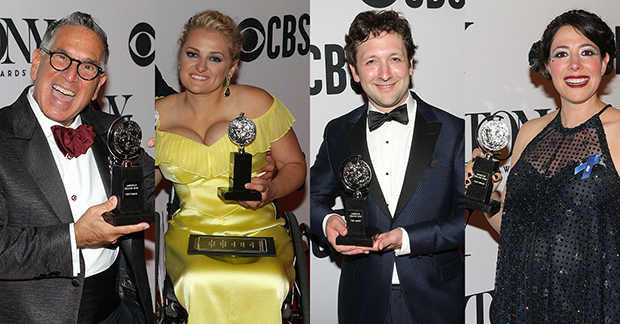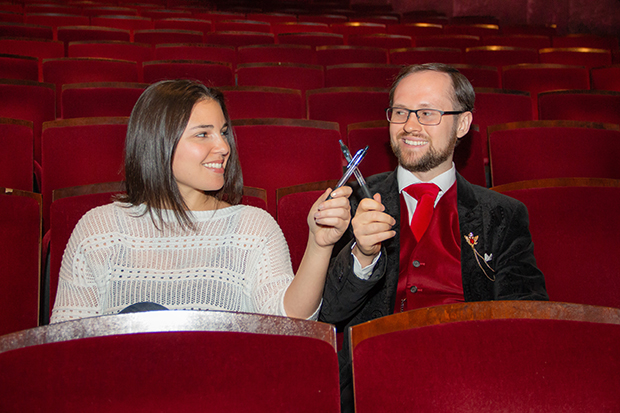Point-Counterpoint: Should You Get a Theater Degree?
Two critics debate the question.

(© David Gordon)
Conventional wisdom tells us that girls go to college to get more knowledge; but how true is that, really? Does one plunk down six figures to enter a prestigious school just for the love of learning, or because one is hoping to get a job out of it? More often than not, it's the latter — and that includes infamously low-paying jobs like "actor." But when there seems to be one job in the theater for every 100 theater majors these days, how insane is it to enter a university theater program? Critic Hayley Levitt thinks it's very insane, but critic Zachary Stewart isn't so sure. Could this just be him retroactively justifying a bad investment in his own overpriced theater degree? You be the judge in our latest Point-Counterpoint:

(© Seth Walters)
Hayley Levitt: Zach, what are your feelings about everyone in the Broadway community these days coming out of prestigious BFA programs? I know you yourself got a BFA. Do you think that's a necessity if you want a career in the arts?
Zachary Stewart: As someone who holds a theater degree (from New York University), I will be the first to admit that it is absolutely not the right choice for everyone. In fact, I've recently heard from several of my former classmates who really regret the time, money, and emotional energy they spent on drama school. However, in perusing the bios in the stack of show programs on my desk, a few names regularly reappear: Juilliard, Yale Drama, Carnegie Mellon Drama, University of Michigan Musical Theatre. Statistics tell a similar story: In the 2018-19 season, 51 UMich graduates appeared on Broadway. Carnegie Mellon and Juilliard each had 42. NYU could claim 109 Broadway performers for last season alone. I'd like to believe that if you're talented enough, you shouldn't need to commit to paying six figures for a degree in order to work professionally in the New York theater. But the evidence suggests otherwise right now, especially for younger artists.
Hayley: But why is that? I don't want to discount the value of quality training. I get it. Singing and acting are technical skills that you have to learn and practice. But putting artistic validation behind this expensive barbed wire and packaging it like academia feels so sterile — and like another con of our exclusionary higher education system.
Alice Ripley mentioned her BFA (from Kent State) in her 2009 Tony Award acceptance speech.
Zach: That's exactly what it is! I have no doubt that the training at many of these programs is top-notch, but I think the network that one develops at a university theater program is more important when it comes to employment. You're meeting the people who may become your future collaborators, and that includes both students and professors. If one of them directs a Broadway show, thinks you're right for a part, and likes working with you, they might just bring you along for the ride. And when you consider that huge advantage over performers who show up in New York knowing no one, maybe the enormous price tag for some of these programs is worth it.
Hayley: That is an insane system for an industry known for its lack of financial viability. So we're going to send future artists into extreme debt so they can network with people who might one day give them a job that offers health insurance? There has to be a less prohibitive way to network, especially for a community that (in an ideal world) is supposed to be about a free exchange of ideas.
Zach: As my favorite playwright, Charles Ludlam, was so fond of saying, "You are a living mockery of your own ideals. If not, you have set your ideals too low." The theater should be a place where people from diverse backgrounds come together to create art, but in reality (at least at the professional level), it rarely is — especially when it comes to class diversity. I would love to see some of the major theaters in New York give more space to talented autodidacts and outsider artists, but considering that the economics of the theater are as precarious as you say, what are the chances of that happening?

(© Hayley Levitt)
Hayley: Probably pretty slim. But how do you think this system is affecting the quality of the artists it produces? I can't speak from firsthand experience about BFA or conservatory programs. But I, like every other privileged kid from upper middle class New Jersey, got sucked into the academic rat race. I ended up doing my undergrad at Harvard, where yes, I got a great education (in philosophy, not theater), but everyone there knows that they (or their parents) are primarily paying for a brand name and the opportunity to rub elbows with the next Mark Zuckerberg. I personally became a much more curious person and creative thinker outside of college than I ever was in college where everything was broken down into academic units, curriculum requirements, and networking events. I can't imagine a little bit of that creative spark isn't also dampened for arts programs, where, theoretically, creativity is most important. But please, correct me if I'm wrong.
Zach: You're not wrong at all. The key to being a successful theater major is finding a way to ignore all of the forces that encourage you to make fear-based decisions, and really make your craziest, wildest art within the padded walls of drama school. Ironically, it was my classmates who did that (rather than constantly worrying about future career opportunities) who went on to careers in the theater! Of course, having that safe space to dream big (and perhaps fail big) is another major advantage of drama school.
Hayley: That's true, if you have a big old flop in college, it's not like the New York Times is writing about it. But what could possibly make someone more scared of failure than wasting a quarter of a million dollars and squandering what they're told will be the most important preprofessional years of their life? Turning artistry into School with a capital "S" seems like the least productive means to our desired end — and if anything, churns out a lot of people who act and sing exactly the same.

(© Zachary Stewart)
Zach: Hayley! All actors are beautiful sand mandalas with their own distinct performance styles. But yes, homogeneity of thought is a real problem for the theater, and it is surely exacerbated by everyone coming down the same pipeline. Elaine May (who won her first Tony at age 87 last year for The Waverly Gallery) never even graduated from high school. She used to audit classes at the University of Chicago and make impertinent comments, and that's how she met a lot of her early theatrical collaborators, including Mike Nichols. I hope that there is someone out there blazing a similarly unorthodox trail toward stardom, but it takes a very strong personality to overcome the institutional barriers currently in place. Right now, if you want to work in the professional theater and you don't have a trust fund, taking out $100,000 in student debt to attend a BFA program actually represents the path of least resistance.
Hayley: It may be worth throwing money at the problem if there's an opportunity to carve out a semblance of a structured path in an artistic field. I just hope it doesn't become the only respected path. We still need the scrappy Elaine Mays of the world.







